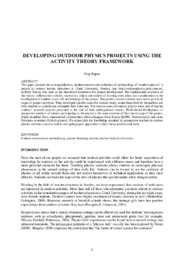Developing outdoor physics projects using the activity theory framework
Abstract
This paper presents the conceptualisation, implementation and evaluation of methodology of “outdoor physics” a
project in science teacher education at Umeå University, Sweden (see http://outdoorphysics.educ.umu.se).
Activity Theory was used as the theoretical framework for project development. The fundamental constructs of
this theory: collaborative activity, motivation, object and context of learning were taken into consideration in the
development of outdoor cases and methodology of the project. Prospective science teachers took active part in all
stages of project activities. They developed specific cases for outdoor study, tested these both by themselves and
with students in schools and evaluated their outcomes. The various cases of outdoor physics were part of teacher
students’ research projects presented at the end of their undergraduate studies. Professional development of
prospective teachers of science participating in the project is the main outcome of the current stage of the project,
which benefited from international collaboration with colleagues from Russia (KSPU, Petrozavodsk) and some
European countries (OutLab project). We expect that the knowledge acquired by prospective teachers in outdoor
physics activities can also lead to new pedagogical approaches in their future professional work.
